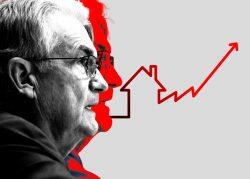Sales of multifamily assets have been hot in the past year, but rising interest rates are now putting investors into a bind.
Negative leverage in the sector is as widespread as it was in the subprime crisis, the Wall Street Journal reported. The crisis resulted in soaring defaults on apartment-building debt.
Negative leverage occurs when the interest rate on a multifamily building’s or portfolio’s mortgage rises to the point where landlords make less money on the assets than the banks, despite carrying the higher risk.
Returns are already shrinking because the cost of buying multifamily buildings is soaring. In the first quarter, prices paid for apartment buildings were up 22.4 percent year-over-year, according to MSCI Real Assets. Investors spent a record $63 billion on apartments in the first quarter, according to CBRE.
Investors have reportedly been buying apartment buildings at a capitalization rate as low as 3.5 percent, NewPoint Real Estate Capital CEO David Brickman told the Journal. Some mortgage rates are as high as 4.5 percent, though, creating negative leverage.
Read more


Interest rates are on the rise, too. In March, the Federal Reserve raised interest rates for the first time since 2018, boosting the benchmark by a quarter of a percentage point. The Fed forecast six more interest rate hikes this year.
The negative leverage phenomenon has some drawing comparisons to the subprime fiasco of the 2000s.
“You’re seeing a lot of the same mistakes,” Nitin Chexal, CEO of Palladius Capital Management, told the Journal.
Despite the troubling trend, few expect a flood of defaults. Investors carry less debt than they did in 2008 and the stability of multifamily assets will likely remain appealing to institutional investors. Additionally, rent growth will bolster returns if it keeps trending upwards.
However, rising interest rates do figure to slow sales of multifamily properties, which totaled $3.2 billion last quarter in New York City.
“The first quarter marks a drastic change in the cost of debt and the expectation is that interest rates will continue to rise,” Ariel Property Advisors president Shimon Shkury toldThe Real Deal. “As a result, we expect momentum to continue in the second quarter as both buyers and sellers rush to complete transactions, but we also expect the second half of the year to be somewhat slower.”
[WSJ] — Holden Walter-Warner
